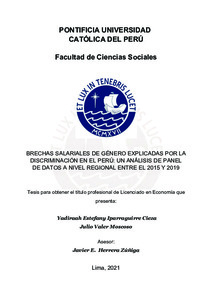| dc.contributor.advisor | Herrera Zúñiga, Javier Ernesto | |
| dc.contributor.author | Iparraguirre Cieza, Yadiraah Estefany | |
| dc.contributor.author | Valer Moscoso, Julio | |
| dc.date.accessioned | 2021-12-17T05:15:50Z | |
| dc.date.available | 2021-12-17T05:15:50Z | |
| dc.date.created | 2021 | |
| dc.date.issued | 2021-12-17 | |
| dc.identifier.uri | http://hdl.handle.net/20.500.12404/21187 | |
| dc.description.abstract | Existe una extensa literatura que da cuenta de que las mujeres se
encuentran desfavorecidas en el mercado de trabajo, a pesar de su mayor
presencia y mayores años de escolaridad. Por lo cual, sigue siendo importante
explorar la brecha salarial de género. En ese sentido, esta investigación busca
analizar la brecha salarial neta de género o la asociada a la discriminación, y si
esta varía regionalmente y macroregionalmente. Esto, porque existe un vacío en
la literatura en cuanto al enfoque regional de la brecha salarial de género.
Además, existen otras razones para investigar en este campo, en especial, para
replantear las políticas públicas.
Se presenta un marco teórico de las determinantes de la brecha salarial
de género: capital humano, discriminación, segmentación, segregación, techo de
cristal y autoselección. A partir de este marco teórico se proponen las variables
explicativas principales que sustentan el modelo econométrico.
La metodología usada para estimar las brechas netas de salario se basa
en una ecuación minceriana corregida por Heckman. Entre nuestros principales
resultados encontramos, en primer lugar, que existe una brecha salarial de
género asociada a la discriminación a nivel nacional. Además de ello,
encontramos que esta brecha varía espacialmente: la brecha neta rural es mayor
a la urbana. En la misma línea, esta brecha también varía macroregionalmente.
Asimismo, presentamos las características fundamentales de la brecha, las
cuales nos permiten, en asociación con nuestro marco teórico, brindar las
sugerencias de política y las conclusiones correspondientes. | es_ES |
| dc.description.abstract | There is an extensive literature that shows that women are disadvantaged
in the labor market, despite their greater presence and longer years of schooling
than men. Therefore, it is still important to explore the gender pay gap. In this
sense, this research seeks to analyze the net gender wage gap or that associated
with discrimination, and whether it varies regionally and macro-regionally. This is
because there is a gap in the literature regarding the regional approach to the
gender wage gap. In addition, there are other reasons to do research in this field,
especially to rethink public policies.
A theoretical framework of the determinants of the gender wage gap is
presented: human capital, discrimination, segmentation, segregation, glass
ceiling and self-selection. From this theoretical framework, the main explanatory
variables that support the econometric model are proposed.
The methodology used to estimate the net wage gaps is based on a Mincer
equation corrected by Heckman. Among our main results we find, firstly, that
there is a gender wage gap associated with discrimination at the national level.
Furthermore, we find that this gap varies spatially: the rural net gap is greater
than the urban one. This gap also varies macro-regionally. Likewise, we present
the fundamental characteristics of the gap, which allow us, in association with our
theoretical framework, to provide policy suggestions and corresponding
conclusions. | es_ES |
| dc.language.iso | spa | es_ES |
| dc.publisher | Pontificia Universidad Católica del Perú | es_ES |
| dc.rights | info:eu-repo/semantics/openAccess | es_ES |
| dc.rights.uri | http://creativecommons.org/licenses/by-nc-sa/2.5/pe/ | * |
| dc.subject | Discriminación sexual en el trabajo--Perú | es_ES |
| dc.subject | Salarios--Mujeres--Perú | es_ES |
| dc.subject | Mercado de trabajo--Perú | es_ES |
| dc.subject | Género--Aspectos económicos--Perú | es_ES |
| dc.title | Brechas salariales de género explicadas por la discriminación en el Perú: un análisis de panel de datos a nivel regional entre el 2015 Y 2019 | es_ES |
| dc.type | info:eu-repo/semantics/bachelorThesis | es_ES |
| thesis.degree.name | Licenciado en Economía | es_ES |
| thesis.degree.level | Título Profesional | es_ES |
| thesis.degree.grantor | Pontificia Universidad Catolica del Peru. Facultad de Ciencias Sociales | es_ES |
| thesis.degree.discipline | Economía | es_ES |
| renati.advisor.cext | 3112001 | |
| renati.advisor.orcid | https://orcid.org/0000-0002-0588-9924 | es_ES |
| renati.author.dni | 72261024 | |
| renati.author.dni | 72846948 | |
| renati.discipline | 421016 | es_ES |
| renati.juror | León Castillo, Janina Virginia | es_ES |
| renati.juror | Gonzales de Olarte, Efraín Virgilio | es_ES |
| renati.juror | Herrera Zúñiga, Javier Ernesto | es_ES |
| renati.level | https://purl.org/pe-repo/renati/level#tituloProfesional | es_ES |
| renati.type | https://purl.org/pe-repo/renati/type#tesis | es_ES |
| dc.publisher.country | PE | es_ES |
| dc.subject.ocde | https://purl.org/pe-repo/ocde/ford#5.02.01 | es_ES |






